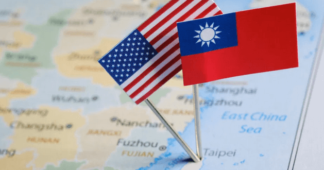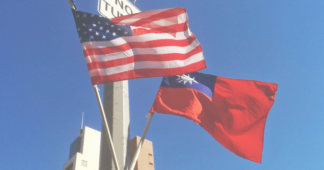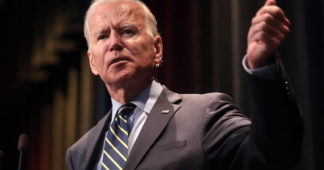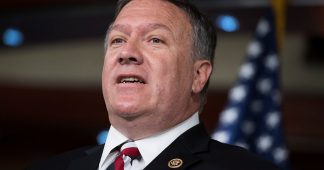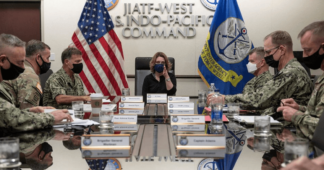It is now apparent that Washington’s commitment to strategic ambiguity is rapidly coming to an end.
By Ted Galen Carpenter
December 29, 2021
Washington’s policy regarding Taiwan has become an increasingly prominent topic in world affairs. On two occasions in recent weeks, President Joe Biden has stated flatly that the United States has a firm commitment to defend the island, only to have subordinates walk‐back his definitive statements of support. Analysts around the world speculate about the real nature of US Taiwan policy and its implications for relations between the United States and the People’s Republic of China (PRC).
For nearly four decades, US administrations, both Republican and Democratic, embraced a stance of “strategic ambiguity” regarding Taiwan’s defense. The Taiwan Relations Act (TRA), which Congress passed when the United States shifted its diplomatic relations from the Republic of China (Taiwan’s official name) to the PRC at the beginning of 1979, created ambiguity from the outset. The TRA declared that the United States would consider any attempt to coerce Taiwan as a serious threat to the peace of East Asia. However, unlike the mutual defense treaty that it replaced, the TRA did not explicitly commit Washington to defend Taiwan militarily. The United States only pledged to continue selling Taipei weapons “of a defensive nature.”
The rationale for strategic ambiguity is that it would induce caution in both Taipei and Beijing. PRC leaders would have to worry that the United States would come to Taiwan’s rescue, leading to a war that China could ill‐afford. Conversely, Taiwanese leaders could not be certain of a rescue — especially if Taipei had provoked a fight by engaging in provocative actions, such as declaring formal independence — and, therefore, would be inhibited from pursuing destabilizing policies. US leaders were supremely confident in the efficacy of that policy, given America’s overwhelming military superiority. However, that superiority no longer exists, and neither Beijing nor Taipei seems content with perpetuating the status quo indefinitely.
It is now apparent that Washington’s commitment to strategic ambiguity is rapidly coming to an end. Indeed, US policy has implicitly been moving toward one of strategic clarity for several years. During Donald Trump’s administration, Washington adopted several measures that noticeably increased Washington’s security ties with Taipei –and those measures enjoyed strong, bipartisan support. Among other changes, high‐level US military and diplomatic officials now routinely met with their Taiwanese counterparts to coordinate policies. Cabinet members traveled to Taipei for high‐profile visits. US arms sales to Taiwan increased and increasingly included sophisticated weaponry that had offensive capabilities. Washington’s diplomatic support for Taiwan, including seeking a larger international role for Taipei, grew steadily, as did US air and naval deployments near the island. Taiwan was fast regaining its status as a US military ally in all but name.
It is far easier to declare strategic clarity than to enforce it, however. Washington faces troubling difficulties in multiple respects. First, China has built an impressive, modern military over the past two decades. The days of Beijing relying on the country’s vast manpower in the form of Mao Zedong’s “people’s army” to wage a war based on attrition (as the PRC did in Korea and later in its war against Vietnam) are long gone. Today, Beijing can deploy air and naval forces equipped with cutting‐edge weaponry that in some respects may be superior to US technology.
Those forces would pose a major threat to US aircraft carriers and other ships if the United States intervened on behalf of Taiwan. American forces also would be operating in waters very close to China but thousands of miles away from the US homeland, a situation that constitutes a major logistical disadvantage. The outcome of such a confrontation would be uncertain, at best. Simulated war games that both the Pentagon and Rand Corporation conducted indicated that the US actually would lose the ensuing fight.
The addition of Japanese and other allied forces on Washington’s side might alter that equation substantially, but that point highlights another difficulty that the Biden administration faces in any effort to implement strategic clarity. There are mixed signs about allied attitudes. Australia insists that it is fully on board with a US‐led defense of Taiwan. “It would be ‘inconceivable’ for Australia not to join the United States should Washington take action to defend Taiwan, Australian Defense Minister Peter Dutton stated in mid‐November 2021. Conversely, South Korea’s leadership has made it apparent that their country wants to stay aloof from the Taiwan quarrel.
Japan’s reaction would be both the most crucial and the most uncertain. A recent public opinion survey found that a majority of Taiwanese were confident that Japan would join with the United States to repel a PRC assault on the Island, but that the Japanese public was less sure. Japanese leaders have made Taiwan a more high‐profile issue in their security calculations, but Tokyo still has refrained from making a firm commitment.
Strategic clarity also could be put to a difficult test if China refrained from attacking Taiwan directly, but moved to occupy one of the many small islands that Taipei claims. There are several potential targets in the Paracel and the Spratly chains in the South China Sea. Would the United States really be willing to use force to expel a PRC garrison occupying one of those holdings, knowing that the cost might well be a full‐scale war with China? Would Washington’s allies be willing to risk a war with Beijing to assist the United States over such meager stakes? There are major doubts about both aspects.

The bottom line is that even a policy of strategic clarity is not all that clear with regard to multiple, crucial considerations. Moreover, it is a policy fraught with risks. Beijing appears to be increasingly determined to stop Taipei’s brazen course toward separate nationhood and independence in all but official international recognition.
At the same time, Washington seems increasingly determined to assist Taipei in that effort and to protect a democratic, self‐governing entity that has considerable strategic and economic importance. Wars have begun over far more modest stakes. Washington’s move toward strategic clarity is increasing the risk of a catastrophic collision between the United States and the PRC.
Published at www.cato.org
We remind our readers that publication of articles on our site does not mean that we agree with what is written. Our policy is to publish anything which we consider of interest, so as to assist our readers in forming their opinions. Sometimes we even publish articles with which we totally disagree, since we believe it is important for our readers to be informed on as wide a spectrum of views as possible.
